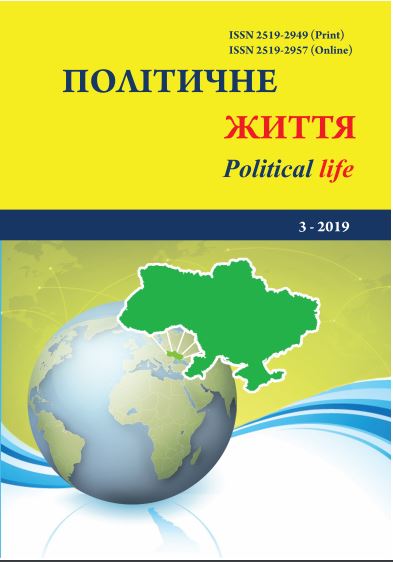Problem of Polish staff functioning in qualitative issues: «Niedziela» and «Tygodnik powszechny» (1989–2005).
DOI:
https://doi.org/10.31558/2519-2949.2019.3.16Keywords:
axiology, postcommunism, political culture, postcommunist consciousness, morality, valuesAbstract
The article deals with the «postcommunist syndrome» in the functioning of the Polish state of 1989– 2005. The analysis is carried out on an example of the special features of the political culture of Polish society: axiological, that is, the predominance of traditional moral values in public opinion. The features of problem-thematic measurements are singled out, the specificity of coverage of state-building processes on the pages of high-quality press is investigated; The problematic and thematic models are highlighted: «Solidarnist’», «Postcommunist Consciousness», «Modern Polish Politics», and the problem of «postcommunist syndrome» in the functioning of the Polish state. A comparative description of the problems of the functioning of the Polish state in the journalism of high-quality Polish editions: «Tygodnik powszechny» and «Niedziela» was carried out. The general scheme of the specificity of the coverage of the state-building processes of these editions is presented.
The research analyzes the journalistic materials of editions in several thematic areas: political, economic, legal, religious. It has been found out that these publications have common and distinctive features in the presentation of the problems of the formation of the Polish state. According to the publicists of both editions, a «postcommunist syndrome», a post-communist consciousness that destroys all the positive democratic transformations in the Polish state, is a major problem on the path to the formation of true democracy.
Of great importance, these high-quality publications provide the morals and religiosity of Polish politicians and Polish society. The authors condemn the antimaliness of communism, fascism and racism, as well as some modern European liberal values (abortion, avtonomy, drugs). An equally important problem is the economy in crisis, as well as the legal field of the state, which has not yet been formed. The study specifies the specifics of coverage of political problems of the Polish state (1989–2005).
References
Bogdanowski A. Wybory. Niedziela. 1994. № 19. S. 12.
Воrtnik C. Klencenie preambuly konstytucyjnej. Niedziela. 1997. № 1. S. 16.
Czuba K. Co przyniosł zjazd «Solidarności»? Niedziela. 1995. № 28. S. 12.
Gach P. Chrześcijaństwo w postkomunistyczniej Europie. Niedziela. 1996. № 42. S. 14.
Goryszewski J. Polska gospodarka u progu 1994 roku. Niedziela. 1994. № 4.
Graczyk R. Musi nastąpić przebudowa systemu (Rozmowa z Tadeuszem Mazowieckim) Tygodnik powszechny. 1989. № 7. S. 3.
Klauza K. Wołanie o etycę w polityce. Niedziela. 1999. № 25.
Koprowski M. Sojuz ognia i wody. Niedziela. 1993. № 7.
Kore J. Paradoksy paryskiej «Kultury». Lublin, 2004. 534 s.
Kozłowski M. Noworocznyj goroskop. Tygodnik powszechny. 1990. № 1.
Niesołowski S. Polityka a rzeczywistość postkomunizmu. Niedziela. 1993. № 3.
Oświadczenie. Tygodnik powszechny. 1989. № 1. S. 7.
Piwowarski W. Ideologia chrześcijańskiej demokracji. Niedziela. 1993. № 9.
Polak-Pawkiewicz E. Mit otwartości. Niedziela. 1999. № 15.
Regiewicz T. Gorący oddech demokracji. Niedziela. 1999. № 25.
Remuszko S. Jak uniknać «polskiego piekła». Tygodnik powszechny. 1990. № 20.
Ryszka C. Budżet uwłaszenie. Niedziela. 1999. № 3.
Ryszka C. Homor polityków. Niedziela. 1999. № 5.
Sczepański J. Obyczajność polityki. Tygodnik powszechny. 1995. № 50. S. 5.
Słonka W. Sumienie w państwie? – Tak? – Sumienie upaństwowione? – Nie! Niedziela. 1995. № 8.
Stauna S. Początek nowego etapu. Niedziela. 1989. №16. S. 1.
Tischner J. Polityka i duszpasterstwo. Tygodnik powszechny. 1991. № 42. S. 1.
Tischner J. Smugi cienia czyli wiara religijna po komunizmie. Tygodnik powszechny. 1993. № 1. S. 1.
Wielgut K. Niedostrzegana bitwa. Niedziela. 1993. № 15.
Zięba M. Dwa, a nawet trzy liberalizmy. Tygodnik powszechny. 1993. № 1. S. 1.

